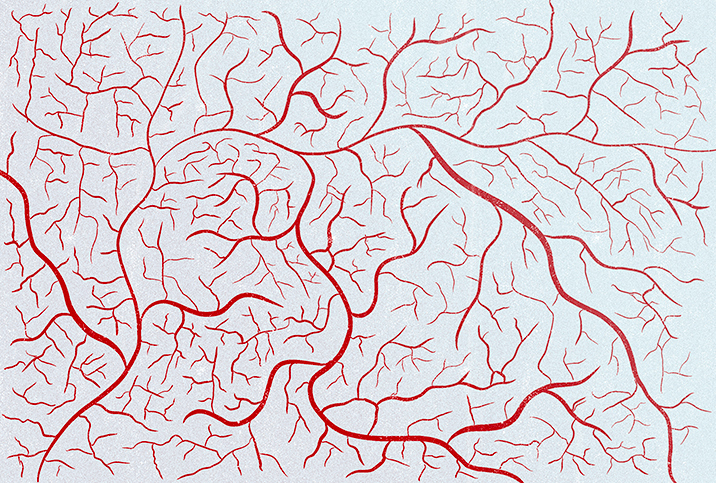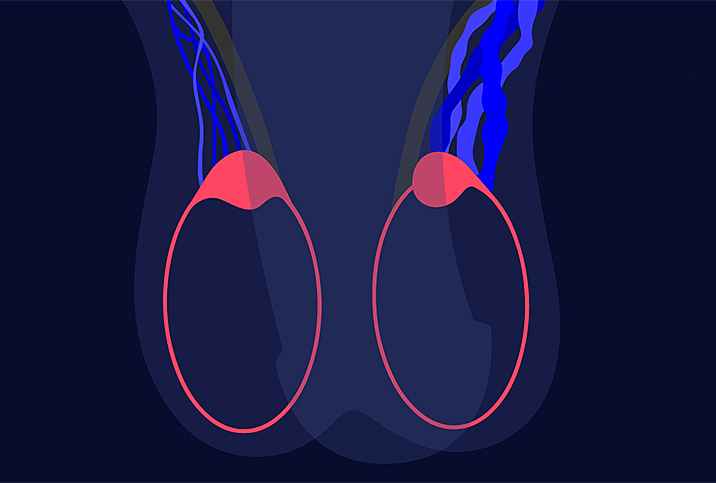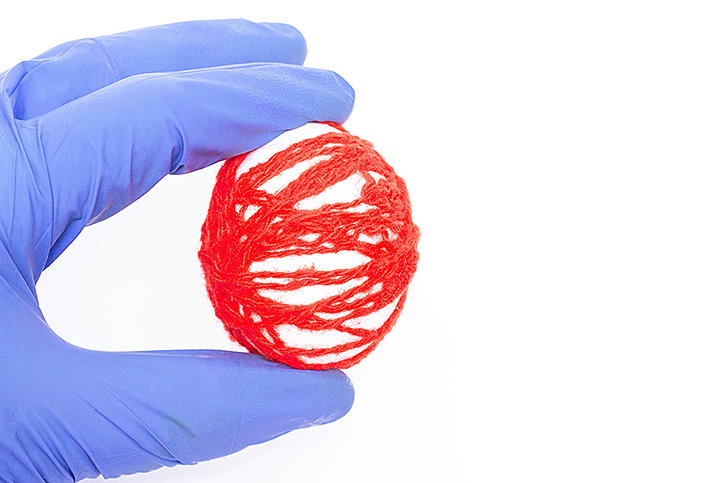Can Varicocele Surgery Improve Your Premature Ejaculation?

Reaching the finish line too early for your or your partner's sexual satisfaction can cause mental anguish and strife in the relationship. A varicocele is one of the many potential reasons for someone to experience premature ejaculation (PE).
A 2016 study suggests the surgery to fix the vein problem, a varicocelectomy, can also improve issues with premature ejaculation.
But before we dive into varicocele surgery and premature ejaculation, let's first examine what a varicocele is.
What is a varicocele?
"A varicocele is an enlarged vein in the scrotum," said Vijay Goli, M.D., the chief of urology at Summerlin Hospital and Southern Hills Medical Center in Las Vegas and the chief medical officer at Rise Medical, a sexual wellness practice. "It is identical to varicose veins that you sometimes see in a person's legs."
Varicoceles are common, affecting 15 percent of healthy men and up to 35 percent of men experiencing infertility.
"Varicocele in the scrotal area is due to blood not flowing back to the heart normally," Goli said, adding if the valves that regulate the blood flow to and from the testicles become defective, the blood backs up, causing a varicocele. "Varicoceles are graded 1 to 3, with 1 only being noted on ultrasound, 2 being somewhat palpable on examination, and 3 being easily seen through a patient's scrotal skin."
He explained that the veins help cool the blood before it travels to the testicles. Usually, the testicles remain a few degrees cooler than the body, which is optimal for sperm production.
If a varicocele occurs, it can raise the temperature of the scrotum. In turn, this can cause the sperm to denature due to higher temperature, which may result in infertility. A varicocele doesn't always cause infertility, though, as two-thirds of men with a varicocele do not have fertility problems.
What is a varicocelectomy?
"A surgeon can perform a varicocelectomy to resolve the varicocele," Goli said. "They can do this to improve fertility and pain, and some studies have also shown improvement in premature ejaculation."
Essentially, a varicocelectomy is a surgery that removes or addresses the swollen veins inside the scrotum that could be impacting testicular function, said Justin Houman, M.D., a reproductive urologist and men's health specialist at Tower Urology in Los Angeles.
A varicocelectomy involves cutting the veins and then closing off the ends. Surgeons can do this in several ways, but two are the most common:
- Microscopic varicocelectomy. A small incision is made above the scrotum. Then, using a powerful microscope, the surgeon ligates (ties up) the veins. This takes two to three hours.
- Laparoscopic varicocelectomy. Through small incisions in the abdomen, the surgeon inserts a small camera and surgical instruments attached to thin tubes to ligate the veins. The veins are less complex in the abdomen area, so the procedure is shorter, lasting 30 to 40 minutes.
Both procedures require a general anesthetic, but most men can go home the same day.
Houman advised that the best candidates for a varicocelectomy have a palpable varicocele, are experiencing pain, have abnormal semen parameters or are having fertility issues
However, research suggests a varicocelectomy might also help with premature ejaculation.
Why would it work for premature ejaculation?
Houman explained that the testicles are known for two functions: producing sperm and testosterone. A varicocele can impact both of these functions.
"My sense is that it's related to the testosterone levels," he said. "We know that a varicocele can cause low testosterone levels, especially if they have bilateral varicoceles. Therefore, it could affect ejaculation in several ways, including causing premature ejaculation. If you can correct the varicocele with surgical intervention, it could address this."
In fact, the previously mentioned 2016 study suggested that a varicocelectomy could improve premature ejaculation in patients with bilateral varicoceles. Goli added that research shows a varicocelectomy leads to improved spermatogenesis, or sperm cell development, which likely causes improved sexual function.
Another small study, this one published in 2020 in the Basrah Journal of Surgery, found premature ejaculation in patients with a varicocele might be related to the development of prostatitis due to the backflow of blood from the varicocele. The study suggested that performing a varicocelectomy in patients with both varicoceles and premature ejaculation can improve this sexual dysfunction.
Several other studies also imply a varicocelectomy could be a favorable option for men who have a varicocele and have not responded to medical treatments for premature ejaculation. With this in mind, are there other treatments to try first?
Alternative premature ejaculation treatment options
"There are a lot of nonoperative ways to address premature ejaculation through various wipes and gels that could slightly desensitize the skin of the penis or increase ejaculation time," Houman said, adding that there are also medications available.
Medications prescribed for premature ejaculation are called selective serotonin reuptake inhibitors (SSRIs), which are usually used to treat depression. One of their side effects is delaying ejaculation, which is why they help treat premature ejaculation.
There are two types of premature ejaculation. With primary premature ejaculation, the problem in the patient has always existed. With secondary premature ejaculation, the problem has recently developed. If premature ejaculation is secondary to another physical or psychological condition, then treating the underlying problem should help.
Psychological therapy can be useful if there is a mental cause for a person's premature ejaculation or if they have a past trauma to work through. Behavioral therapy is another treatment option that helps a person build a tolerance to delay ejaculation through a series of exercises.
Anesthetic creams, gels and sprays can make the penis less sensitive. Using these with a condom can be very effective. In addition, some self-help techniques include:
- Masturbating an hour or two before having sex
- Using a thick condom to help decrease sensation
- Taking breaks during sex or using distraction techniques
The Urology Care Foundation notes that 95 out of 100 men recover from premature ejaculation after trying the treatments listed above.
However, Houman advised that all medications have side effects.
"It's essential that each individual discusses their treatment options with a urologist or healthcare provider to weigh up the risks versus benefits for each treatment, including surgery," he concluded.


















